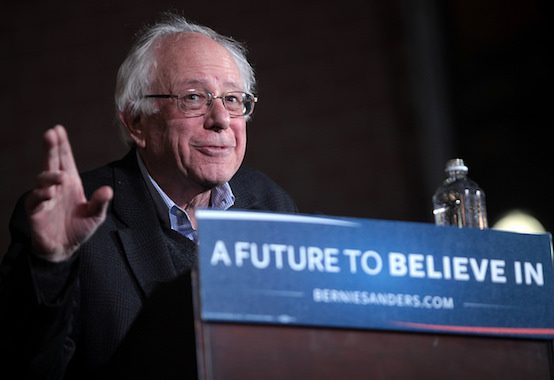No, Bernie Sanders Is Not an Alt-Right Knucklehead

What’s convenient about reading Kevin Williamson is that one can always figure out who the good and bad guys are. The goodies are the moderate libertarians who favor lots of immigration, especially from Third World countries, and who happily dump on those whom they consider to be “white racists.” The baddies, predictably, are the “populists,” both Left and Right, who favor more restrictionist immigration policies.
In a recent column entitled, “What Bernie Sanders shares with Trump—and Mussolini,” Williamson dwells on the common ground supposedly shared by the right-wing populist Trump and the left-wing populist Sanders. Both see trade “as a zero sum game” and oppose immigration, which Williamson regards as a blessing. Moreover, “Sanders is a man of ideas, he is—not that he’d ever admit it—a man of Trump’s ideas.”
Sanders, furthermore, has complained about “guest workers who will work for lower wages than American workers,” (Sanders’ words), and this links him not only to the immigration restrictionist Trump, but, according to Williamson, also to the even more right-wing Steve King of Iowa, who shares Sanders “beady-eyed zero-sum view of immigration.”
[Editor’s Note: The above passage was edited to clarify that Williamson quoted Sanders directly; he did not paraphrase him, as suggested in the original.]
Like his kindred spirit Trump, “Sanders has been all too happy to appropriate the rhetorical scheme of the alt-right knuckleheads (remember them?), denouncing those who take a more liberal view of immigration as advocates of open borders.” Moreover like Trump, “Sanders is an anti-liberal-and fundamentally a nationalist.”
“He is a practitioner of a very old and established kind of politics that would have been familiar to such frankly nationalist politicians as Franklin Roosevelt (and Teddy Roosevelt for that matter, Woodrow Wilson and Benito Mussolini.”
To his credit, Williamson never hides his list of villains. But alas, the genealogy that he’s created for Sanders is far from convincing. The European Left and American labor unions long opposed immigration that might have had the effect of shrinking the wages of indigenous workers. The American Federation of Labor supported the 1924 immigration restriction act, and Western European Communist parties after the Second World War opposed the import of cheap labor from the Third World.
Those who took this position were not promoting nationalist causes. They were appealing to workers who were afraid of being laid off or at the very least having their earnings reduced because of imported competition. Since Williamson has expressed shocking contempt on at least one occasion for America’s (white) working class, one doubts that he shares this concern. It is, however, one that Sanders expressed, when he made the classical socialist argument against immigration, as recently as 2010.
Of course there’s no reason to ascribe to Sanders racist motives for once having taken a well- established pro-worker-position. It is one that he shared with, among others, the head of California’s largely Latino farm workers’ union Cesar Chavez. Chavez’s vociferous attacks against immigrants who had come into the country illegally (thereby endangering the wage scales of legal workers) became so legendary that his picture now graces every poster celebrating National Border Control Day.
One might also question whether all the “frankly nationalist politicians” whom Williamson associates with Sanders embraced either nationalism or populism. American populists, who founded their own party in the 1890s, were decentralists. They were also states-rightists who believed that the federal government had arrogated to itself too much power. An American Populist Party, which was founded in 2009, emphasizes the same decentralist principles as the earlier populists, while attacking large corporation and administrative overreach. Williamson misrepresents other things as well. FDR and other New Dealers believed in centralized, “scientific” administration, which doesn’t necessarily mean they were “nationalists.” It means they were administrative centralizers.
The appearance of Mussolini on Williamson’s list is a now widely used scare tactic, by which those whom a writer dislikes are compared to Mussolini or Hitler. Not surprisingly, Williamson has opted for this tiresome practice. I also have to wonder about his justification for saying “liberalism” is the natural enemy of “nationalism.” In the 19th century, liberalism and national identity, as shown in my book After Liberalism, traveled in the same company. Outside of England, which was then the world’s industrial leader, most self-described liberals favored protectionism. They also regarded the political unification of nations, as being fully consistent with their convictions. The Israeli historian Yoram Hazoni correctly identifies the process by which freedom and nationhood became intertwined historically.
Perhaps most relevant for these critical remarks is that Sanders has sharply changed the focus of his political message over the years. He is no longer an immigration restrictionist, according to an older socialist tradition. In his announcement of a presidential bid last week, Sanders emphasized leftist identity politics and vowed to fight sexism, racism, and homophobia. His earlier views about immigration, which Williamson views as an essential part of his political persona, was not even present in these remarks.
Sanders, in launching his presidential bid, did talk about free college tuition for all, universal health care, and raising the minimum wage to $15 an hour, all of which have been his signature positions. But as Tucker Carlson correctly observed, the 77-year-old presidential candidate has become an “identity politics drone.” In his tirade, Williamson has thrown together Sanders’s abandoned stands of yesteryear and tried to force them into a pattern of his own devising. Welcome to the 2020 presidential campaign.
Paul Gottfried is Raffensperger Professor of Humanities Emeritus at Elizabethtown College, where he taught for 25 years. He is a Guggenheim recipient and a Yale Ph.D. He is the author of 13 books, most recently Fascism: Career of a Concept and Revisions and Dissents.
Comments